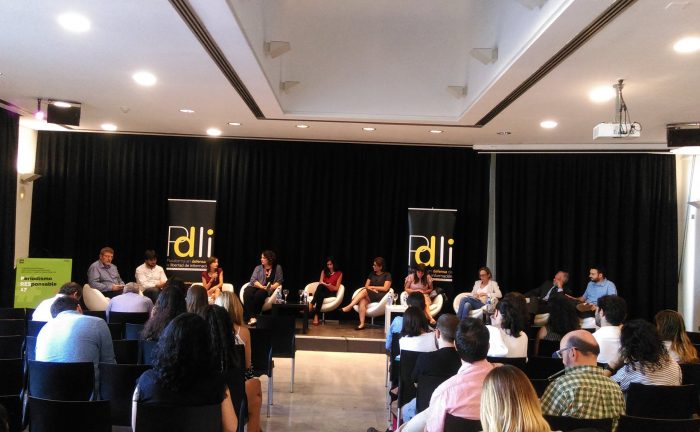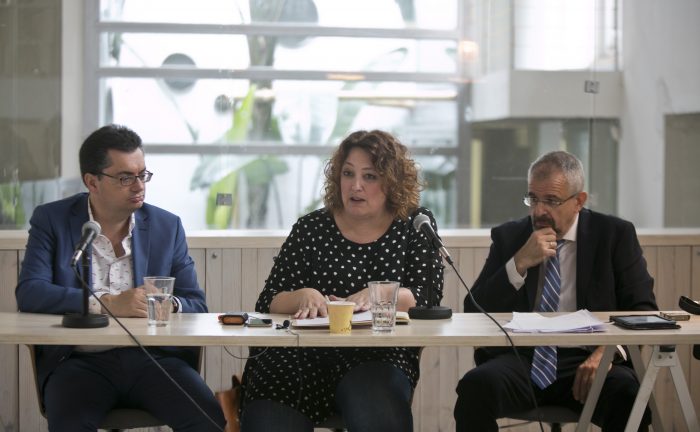About us
Who we are
The Platform for the Defence of Freedom of Information (PLI), was established in November 2014 and today is a key player in the fight to preserve freedom of information in Spain.
The PLI is an independent, non-partisan and plural entity, made up of media, groups of journalists and lawyers, social and academic organizations, as well as research groups from Spanish Universities (SEE ‘Members’). The positions of the PLI, which are independent of any political ideology or partisanship, are based on the most rigorous legal analysis of each case, and follow international legal standards on freedom of expression and information.
The PLI seeks to work in partnership. For this reason, it promotes joint and coordinated campaigns with international organizations and groups for the defence of freedom of information such as the International Press Institute (IPI) or the European Center for Press and Media Freedom (to which it belongs, as the only reference partner in Spain for issues of press freedom and journalist safety), among other organizations.
DOWNLOAD BRIEFING ABOUT PDLI (Pdf)
The main mission of the PLI is the defence of freedom of information and expression, freedom of the press and the free flow of news and opinions.
Shares
Among the activities carried out by the PLI, of special note are the monitoring and dissemination of any attacks on freedom of expression and information. The fruits of this work are the yearly publication of an annual report with a balance of the situation in Spain. In addition, we publish monographs, mainly of a legal nature, which provide an in-depth analysis of a specific problem regarding the exercise of these freedoms
We also promote political advocacy campaigns to react to draft bills that restrict freedom of expression and information and carry out training activities (conferences, seminars). In addition, we develop digital tools, such as mapea.cc, an application to report abuse or incidents against freedom of expression or information.
- Monitoring and publicizing cases on social networks, via the web and through the media.
- Advocacy and denunciation actions before institutions
- Preparation of publications: annuals, manuals.
- Training seminars and workshops.
- Organization and/or participation in congresses, conferences, symposia and debates.
- Development of digital and visualization tools: mapea.cc / Timeline.
- Awareness-raising or public appeal campaigns, among other actions through ‘decalogues’ or ‘manifestos’.

OUR VISION: PRINCIPLES AND VALUES
Our actions and positions are governed by international standards on freedom of expression and information based on: international agreements and treaties (mainly the Universal Declaration of Human Rights, the International Covenant on Civil and Political Rights of 1966 and the European Convention on Human Rights and Fundamental Freedoms of 1950); recommendations of international organizations on these rights (UN, UNESCO, OSCE) and jurisprudence of the ECHR and our Constitutional Court.
The right to information (accurate and of public interest) is a key component of the democratic system, which is owned by citizens. Any initiative or action against this fundamental right (whether provided by the media, professional journalists or any other person) will encounter our opposition and denunciation.
The operation and positions of the PDLI are governed by their Articles of Association in accordance with the Associations Law and a programmatic document that includes the guiding principles of its actions.
- The Articles of Association of the PDLI are available here.
- The document ‘Principles and values of the PDLI’ are available here.
SCOPE OF ACTION
- Human Rights and Fundamental Freedoms: Freedom of expression, freedom of information, right to information, right to protest.
- Transparency and access to information.
- Media regulation: audiovisual market, free competition
- Freedom of the press, journalism and protection of journalists.
- Journalism, media and innovation: business models, data journalism, investigative reporting, technologies in journalism
- Responsible journalism: journalism and women, journalism and minorities.
- Digital rights and Internet regulation: privacy, online surveillance, Internet freedoms and their limits – copyright, fake news…-, cybersecurity.
- Information leaks and protection of whistleblowers.
- Fake news, disinformation and fact-checking
- Freedom of expression and its limits.


